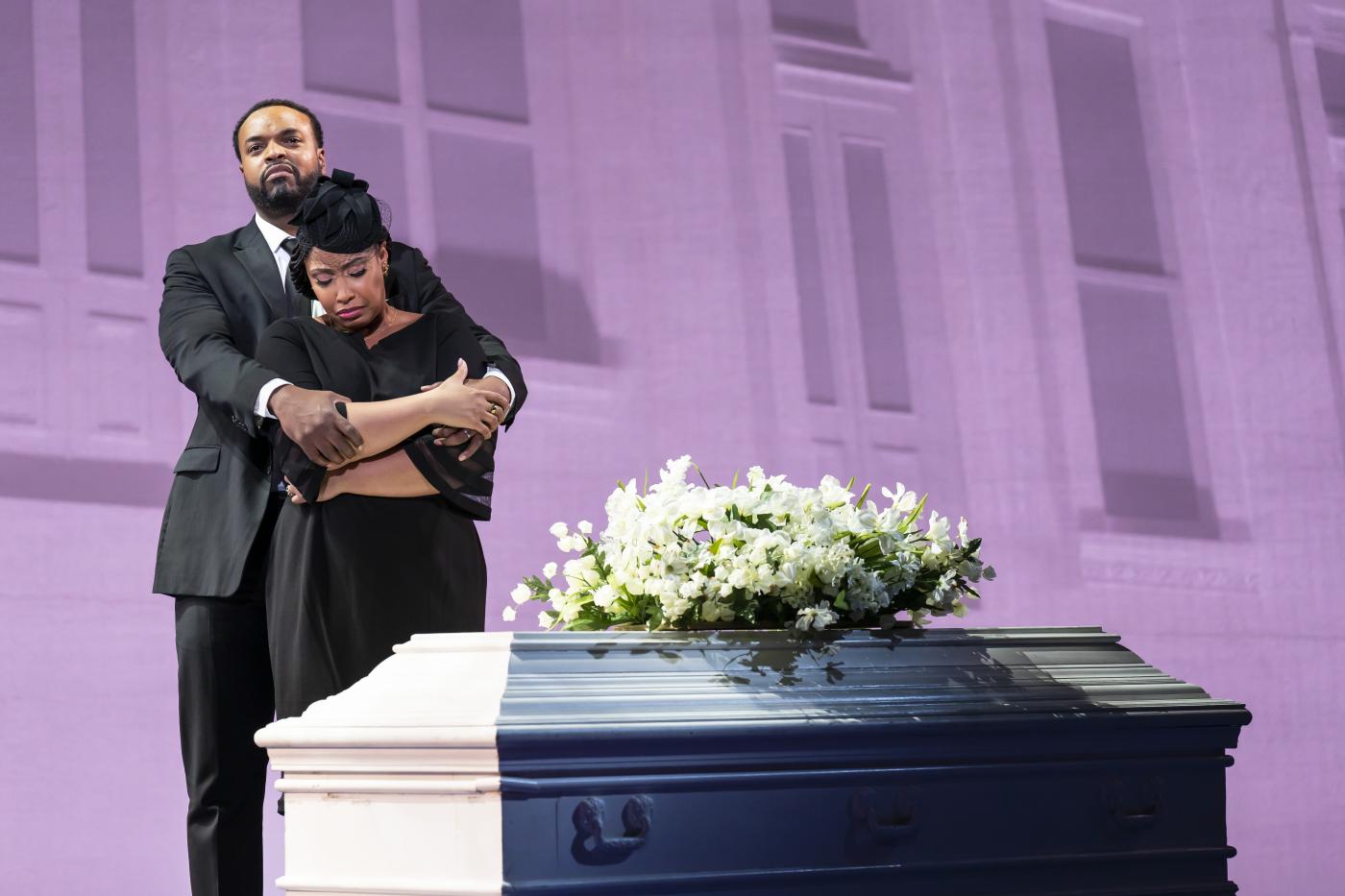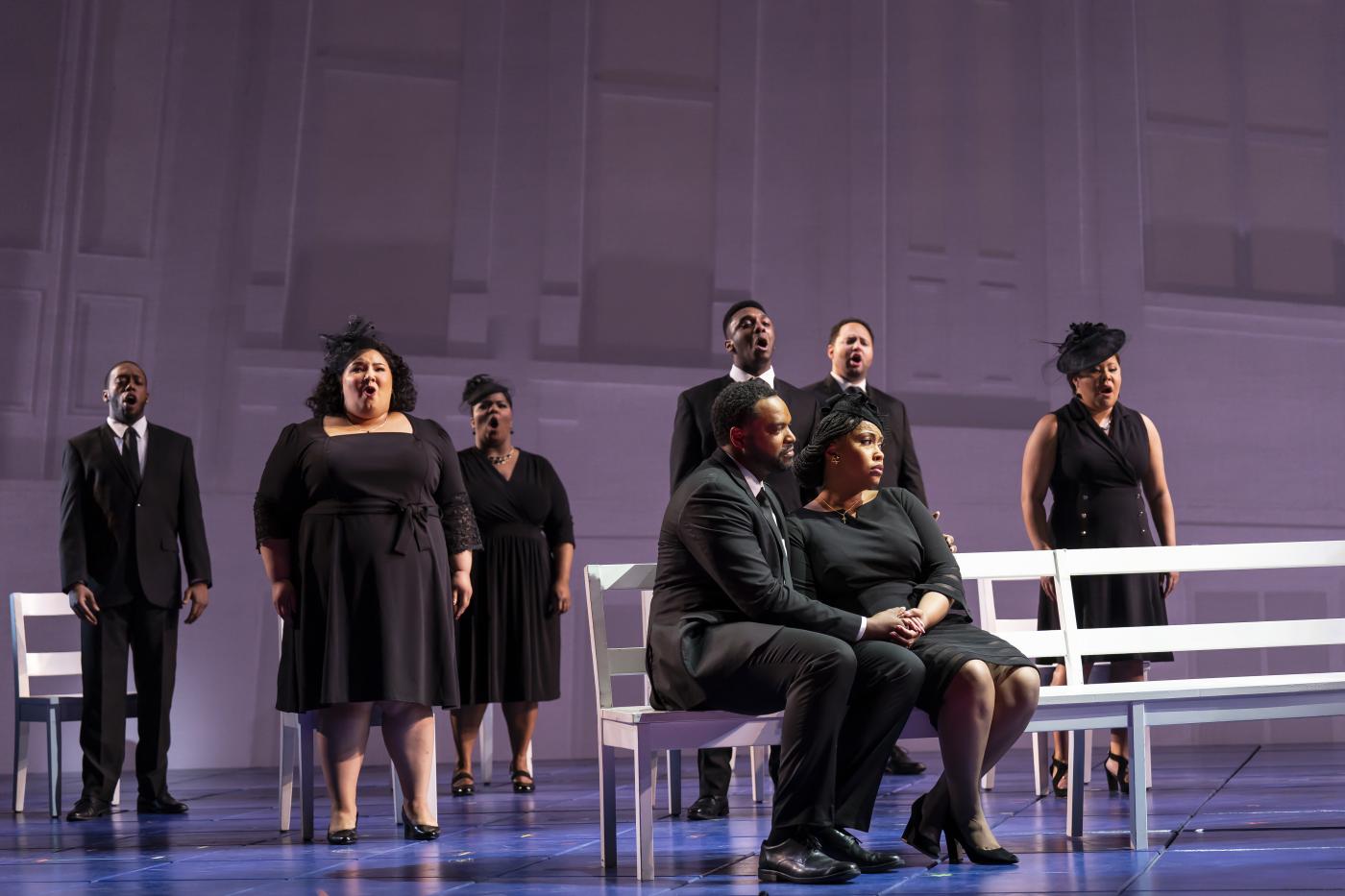“For me, the goal of performing arts is dialogue,” says Francesca Zambello, Artistic Director of Washington National Opera. From the very first scenes of Blue, the opera Zambello commissioned, we become engaged, enmeshed in the life of a Black middle-class family, and we become a part of their community. We feel their anticipation and joy at the birth of a baby boy, as they look to a future of hope and love.
I asked Ms. Zambello why Blue has so much emotional power, and why we are so viscerally moved when we hear, say, the deep bass voice of The Father, sung by Kenneth Kellogg, as he shares his love, joy, frustration and grief.
FZ: Theater, opera and music can take the big issues and personalize them in a way that touches the core of our human soul. I believe that great art has the power to foster empathy, fuel progress, and bring healing. It can deliver Blue’s message of hope and humanity in a way that resonates with us all.
NL: What do you think a contemporary opera should be?
FZ: Contemporary opera should have a story that engages us, whether that's a story from the news or a comedy. But to me, the great operas are driven by personal stories and personal elements that touch on larger issues. And today, of course, we are often using theater and opera the way that the Greeks did to confront the issues that we maybe can't even understand.
I'm also in favor of creating contemporary operas that are comedies, which we have demonstrated in some of our recent commissions.
NL: What role did you play in developing Blue?
FZ: It was sometime around the year 2016, I was very disturbed about what seemed like so much senseless killing of especially young black men. And I asked my friend, Tazewell Thompson, to help me understand why this issue seemed to be in the news all the time, even more than in the past. And you know, we continued to have a lot of philosophical conversations about it. From these conversations, I encouraged Taz to create a story that speaks from his experience, and that he should direct it. That was really the genesis of this opera.
At the time, Taz had never written a libretto, though he’d written a number of plays. So I said let’s work together with composer Jeanine Tesori to create a libretto that really sings. Because the libretto is really the structure, or the beams of the house, and the music goes on top of it. So it became a very generous and fruitful collaboration between the three of us in creating the story.
The story went through a lot of versions, of course. The main character began as a jazz musician before we decided that he should be a police officer.
I think it’s also important to realize that many of the experiences in the story are drawn from Taz’s own life. He has shared with me many of his own stories of harassment that happened to him.
But that was really the beginning of this opera that we now know as Blue.
NL: Blue is a simple story, but beautifully crafted. The structure is spare—3 principals and a male and female chorus who comment on the action like in a Greek play. It’s a universal story...think of Messiah, or a Stabat Mater. It is inspired by the writings of two authors (Ta-Nehisi Coates and James Baldwin). Tazewell Thompson’s libretto is powerful, with quotable lines: “Stay Alive—that's what you’re supposed to do,” the father says to his son. What are some of the most moving episodes in the opera to you?
FZ: From the beginning, we knew this opera would shine a light on the often senseless killings of young black men. But it was really important that it also touched at the notions of family and community.
When I commissioned it, I said, for every parent, regardless of your race, your biggest nightmare is that you will outlive your child. And I said I want them to be part of the story somehow. Through the grief of the parents and their community, in this case their church, we can take the events of the shooting and understand them in a much broader sense.
The other important message was really about community. In the scene where their church and the reverend gather around them to try and help them, I feel it’s so important that we see this black family in a very positive light, as loved and supported members of their broader community.
Also, they are middle class Harlem dwellers, and it was important that they defy stereotypes. There is a pantomime in the beginning of the piece where the Father begins in a hoodie and sneakers and torn jeans and changes his clothes into full police uniform.
I wanted the audience to viscerally feel the scene with the father and the son where they argue: if you have a teenager, then you understand what it is like to argue with a teenager! I have a teenager, and of course every day you send your child out into the New York subway, or out into the world, you can feel like anything could happen. I wanted the opera to capture that sense of worry and concern, to which all parents can relate.
At the time when Jeanine [Tesori] first began composing the piece, her daughter was just finishing high school. So of course, she poured a lot of herself into the experiences of the Mother. I think Taz is the Reverend and the Father and the Son all at once.
NL: Can you speak about the music?
FZ: I first commissioned Jeanine [Tesori] in 2010 for another opera, and then I commissioned her for a holiday opera. I just believed in her voice as a contemporary composer. She, of course, is a Broadway and theater composer, but she's classically trained. When I first went to her, I said you need to be using the art form of opera to express yourself musically. It's a much bigger palette than you may get in the theater in terms of orchestra and voices. I eventually convinced her.
Blue is her third opera. Everyone gets better the more they do it, and I feel that the music is very powerful, very beautiful. The second act has melodies that you will not forget; they will stay with you. Jeanine has the gift of melody. She knows how to set the lyric. I think her greatest element that she brings from music theater is the ability to take a lyric and musicalize it in a way that you hear the words even more powerfully than the words on the page.
NL: So you watch the opera, you are deeply affected, and you go home and...?
FZ: We hope that audiences respond with engagement and greater discussion and dialogue about the issues, with a spirit of trying to understand. I hope we ask, why is violence and the use of force with a gun the retort to many of our problems today? And I want people to go home and think about that, talk about it and do something in their own lives. Everyone is capable of doing one thing! You do not have to change the world. It's not your job to change the world. But it's our job as responsible citizens to do or say one nice thing everyday. Engage in a dialogue and change one person's opinion, or try and understand their opinions or motivations and become changed. It does not help us to remain lost and stuck in the way we think. We all benefit from learning to listen.
NL: Well, the much-awaited WNO premiere of Blue was cancelled at the last minute because of the pandemic. WNO used the down-time time creatively, to develop media including a recording with the cast and the Kennedy Center Opera House Orchestra, and tools to help interested persons take the next step...to learn more, get involved. You developed the “Let’s Go There” series. Tell us about that.
FZ: The “Let’s Go There” series was a way of making it possible for people to understand Blue and talk about and engage in dialogue. For me, the goal of performing arts is dialogue. That’s what we intended for that series. That's actually what motivated all of the online content we created. It was a way of not just keeping the public aware of our work, but our hope was that the content would help people think about things, talk about things and feel that they're part of the process. I want our audiences to feel that they are really part of Washington National Opera’s community.
Washington National Opera presents the DC premiere of Blue, a contemporary opera on racial injustice in the US today. Libretto by Tazewell Thompson set to music by Jeanine Tesori, starring Kenneth Kellogg as The Father, Briana Hunter as The Mother, and Aaron Crouch as The Son. Gordon Hawkins is The Reverend. The Washington National Opera Orchestra is led by Roderick Cox.
March 11-25 at the John F. Kennedy Center for the Performing Arts
PBS PASSPORT
Stream tens of thousands of hours of your PBS and local favorites with WETA+ and PBS Passport whenever and wherever you want. Catch up on a single episode or binge-watch full seasons before they air on TV.

